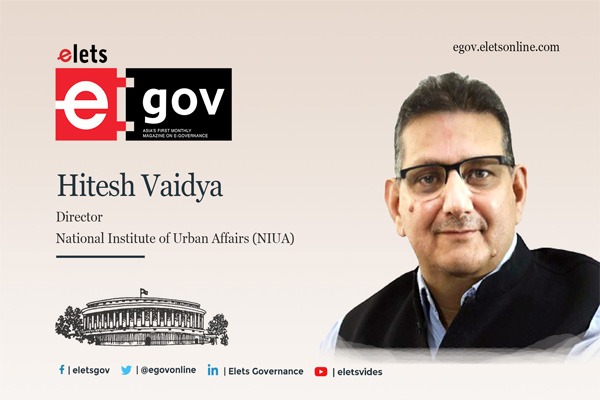
Hitesh Vaidya
Director, National Institute of Urban Affairs
The goal of integrated water resources management (IWRM) is to optimise economic and social welfare in an equitable manner while maintaining the viability of critical ecosystems. IWRM encourages the coordinated development and management of water, land, and related resources.
The conventional, fragmented sectoral approaches to managing water resources that have resulted in unsustainable use and subpar services are being replaced by the cross-sectoral approach of IWRM.

In the context of Indian cities, there is no existing framework for integrated water resource management. Groundwater in and near cities is still unregulated, with significant over-drawl and reports of groundwater contamination while water utilities and Urban Local Bodies (ULBs) anticipate the expansion of water supply from distant surface water sources. Some cities have implemented rainwater harvesting in an effort to save water and better manage their scarce resources, but the results have been modest. The majority of wastewater is released without being treated, resulting in polluting the surface and groundwater.

SDG Target 6.5 calls for countries to “implement integrated water resources management at all levels, including through transboundary cooperation as appropriate”

To track progress towards the target, indicator 6.5.1 monitors the degree of integrated water resources management (IWRM) implementation, by assessing the four key dimensions of IWRM: enabling environment, institutions and participation, management instruments and financing. Meanwhile, indicator 6.5.2 monitors the proportion of transboundary basin area with an operational arrangement for water cooperation.
This edition of SDG 6.5 is a compilation of 8 uniquely articulated articles that captures the perspective of experts, on different aspects of IWRM relevant for Indian cities. This edition takes a comprehensive approach to the role of IWRM in managing the agriculture sector, biodiversity and water management, river basin and springshed management, aquifer mapping and management, groundwater modelling and management, water supply and sanitation management, and so on.
Also Read | SDG 6.4 – Increase Water-Use Efficiency and Ensure Freshwater Supplies
NIUA is committed to help Indian cities in improving their performance against each of the SDG Indicators. In addition to relying on our internal resources to do so, we partner with media houses, academic institutions and other government and non-government organisations, for research, capacity-building and advocacy outcomes. The collaboration of NIUA and eGov Magazine is a demonstration of the same. To come up with this special edition, teams at NIUA and eGov have enthusiastically worked together, to collate a diverse range of knowledge-base on the themes of integrated water resources management.
My sincere thanks to all the authors who have contributed to this special edition and shared their knowledge to make this possible.
Be a part of Elets Collaborative Initiatives. Join Us for Upcoming Events and explore business opportunities. Like us on Facebook , connect with us on LinkedIn and follow us on Twitter, Instagram.
"Exciting news! Elets technomedia is now on WhatsApp Channels Subscribe today by clicking the link and stay updated with the latest insights!" Click here!













